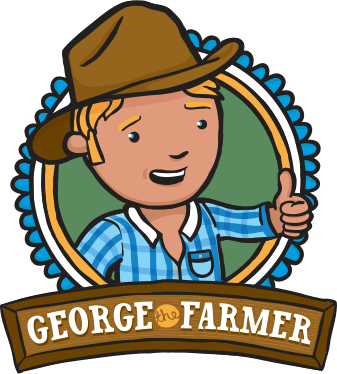** Please note ** This is a downloadable resource. Upon submitting your order, you will receive an email from orders@georgethefarmer.com.au which will contain the download link for the resource/s. Thank you!
-----
This George the Farmer Educational Resource aims to raise awareness about the incredible cotton plant.
We sleep in it, dry ourselves with it, wrap our bodies in it and we even cook with its oil. This George the Farmer educational resource aims to raise awareness about the incredible products that can be produced from the cotton plant.
Natural fibres come from nature and can include plant fibres or animal fibres.
Plant fibres include cotton, hemp and coconut. Animal fibres include wool and silk.
Fibre can be turned into thread or yarn and used to make many products that we use every day like t-shirts, jeans, socks, bed sheets and even paper!
Cotton is both a food and fibre crop and is related to the Hibiscus plant. It is a leafy, green shrub that produces fluffy white cotton bolls after the plant goes through a flowering stage.
Cotton is grown as an annual plant and reaches a height of 1.2 metres.
Squares (flower buds) develop several weeks after the plant starts to grow, with flowers appearing a few weeks later. The flowers then drop, leaving a ripening seed pod that becomes the cotton boll (the fruit) after pollination. The flower of the cotton plant is a self- pollinating type that does not need insects to assist with pollination.
The plant also produces seeds that are contained in small capsules (called locks) surrounded by fibre in the cotton bolls. Each cotton boll usually contains 27 - 45 seeds, and attached to each seed is between 10,000 – 20,000 tiny fibres about 28mm in length.
This free curriculum-aligned educators guide for Foundation - Year 4 levels focuses on Science, Technology, Engineering, Arts, Maths and Sustainability (STEAM) subjects.
The pages in this resource are intended as starting points for a cross-curricular approach to learning, based on the George the Farmer YouTube video “Cotton” and subsequent "In the Classroom" videos about cotton.
The activities seek to complement and extend the enjoyment students will experience from seeing the video whilst at the same time meeting some of the requirements of curriculum outcomes.
The activities in this resource can be printed out for students, or alternatively, display the activity page from the PDF on your interactive white board or import an activity page into your online teaching and learning environment such as Google Slides and have the students use their existing workbooks to complete the task.
This is a FREE curriculum-aligned guide. Enter your details to download the PDF. Payment details are not required.
---
This curriculum-linked learning resource was produced by George the Farmer Pty Ltd for Cotton Australia.



